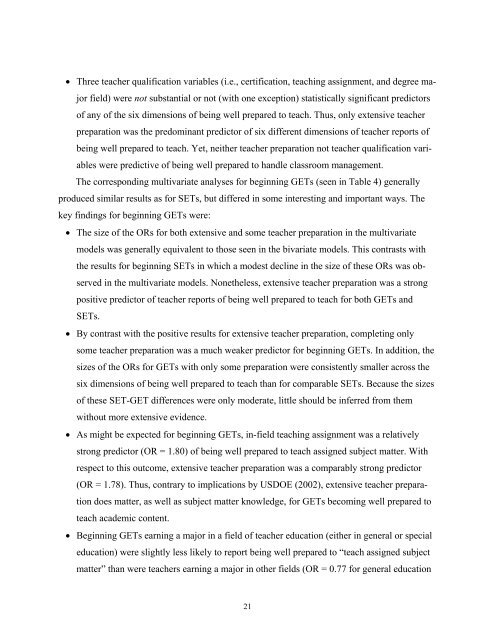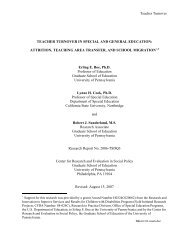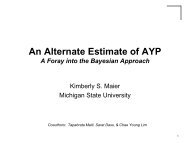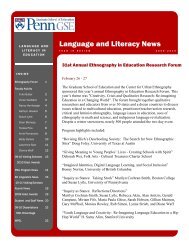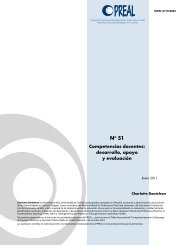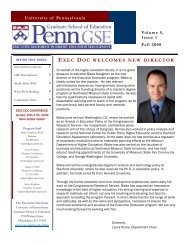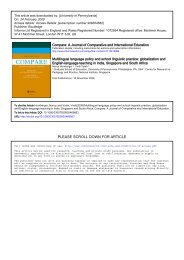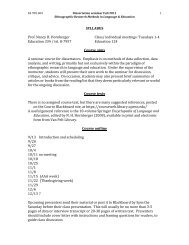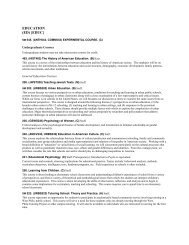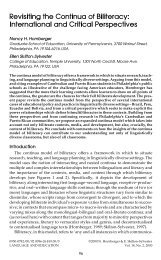does teacher preparation matter for beginning teachers in
does teacher preparation matter for beginning teachers in
does teacher preparation matter for beginning teachers in
Create successful ePaper yourself
Turn your PDF publications into a flip-book with our unique Google optimized e-Paper software.
• Three <strong>teacher</strong> qualification variables (i.e., certification, teach<strong>in</strong>g assignment, and degree major<br />
field) were not substantial or not (with one exception) statistically significant predictors<br />
of any of the six dimensions of be<strong>in</strong>g well prepared to teach. Thus, only extensive <strong>teacher</strong><br />
<strong>preparation</strong> was the predom<strong>in</strong>ant predictor of six different dimensions of <strong>teacher</strong> reports of<br />
be<strong>in</strong>g well prepared to teach. Yet, neither <strong>teacher</strong> <strong>preparation</strong> not <strong>teacher</strong> qualification variables<br />
were predictive of be<strong>in</strong>g well prepared to handle classroom management.<br />
The correspond<strong>in</strong>g multivariate analyses <strong>for</strong> <strong>beg<strong>in</strong>n<strong>in</strong>g</strong> GETs (seen <strong>in</strong> Table 4) generally<br />
produced similar results as <strong>for</strong> SETs, but differed <strong>in</strong> some <strong>in</strong>terest<strong>in</strong>g and important ways. The<br />
key f<strong>in</strong>d<strong>in</strong>gs <strong>for</strong> <strong>beg<strong>in</strong>n<strong>in</strong>g</strong> GETs were:<br />
• The size of the ORs <strong>for</strong> both extensive and some <strong>teacher</strong> <strong>preparation</strong> <strong>in</strong> the multivariate<br />
models was generally equivalent to those seen <strong>in</strong> the bivariate models. This contrasts with<br />
the results <strong>for</strong> <strong>beg<strong>in</strong>n<strong>in</strong>g</strong> SETs <strong>in</strong> which a modest decl<strong>in</strong>e <strong>in</strong> the size of these ORs was observed<br />
<strong>in</strong> the multivariate models. Nonetheless, extensive <strong>teacher</strong> <strong>preparation</strong> was a strong<br />
positive predictor of <strong>teacher</strong> reports of be<strong>in</strong>g well prepared to teach <strong>for</strong> both GETs and<br />
SETs.<br />
• By contrast with the positive results <strong>for</strong> extensive <strong>teacher</strong> <strong>preparation</strong>, complet<strong>in</strong>g only<br />
some <strong>teacher</strong> <strong>preparation</strong> was a much weaker predictor <strong>for</strong> <strong>beg<strong>in</strong>n<strong>in</strong>g</strong> GETs. In addition, the<br />
sizes of the ORs <strong>for</strong> GETs with only some <strong>preparation</strong> were consistently smaller across the<br />
six dimensions of be<strong>in</strong>g well prepared to teach than <strong>for</strong> comparable SETs. Because the sizes<br />
of these SET-GET differences were only moderate, little should be <strong>in</strong>ferred from them<br />
without more extensive evidence.<br />
• As might be expected <strong>for</strong> <strong>beg<strong>in</strong>n<strong>in</strong>g</strong> GETs, <strong>in</strong>-field teach<strong>in</strong>g assignment was a relatively<br />
strong predictor (OR = 1.80) of be<strong>in</strong>g well prepared to teach assigned subject <strong>matter</strong>. With<br />
respect to this outcome, extensive <strong>teacher</strong> <strong>preparation</strong> was a comparably strong predictor<br />
(OR = 1.78). Thus, contrary to implications by USDOE (2002), extensive <strong>teacher</strong> <strong>preparation</strong><br />
<strong>does</strong> <strong>matter</strong>, as well as subject <strong>matter</strong> knowledge, <strong>for</strong> GETs becom<strong>in</strong>g well prepared to<br />
teach academic content.<br />
• Beg<strong>in</strong>n<strong>in</strong>g GETs earn<strong>in</strong>g a major <strong>in</strong> a field of <strong>teacher</strong> education (either <strong>in</strong> general or special<br />
education) were slightly less likely to report be<strong>in</strong>g well prepared to “teach assigned subject<br />
<strong>matter</strong>” than were <strong>teacher</strong>s earn<strong>in</strong>g a major <strong>in</strong> other fields (OR = 0.77 <strong>for</strong> general education<br />
21


